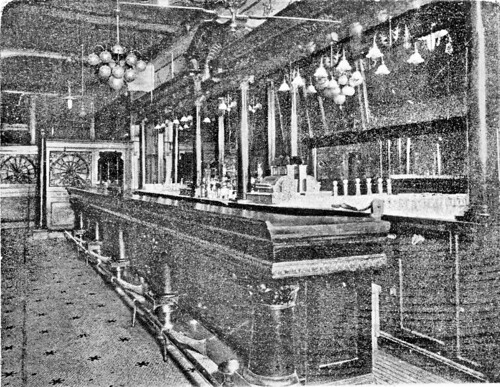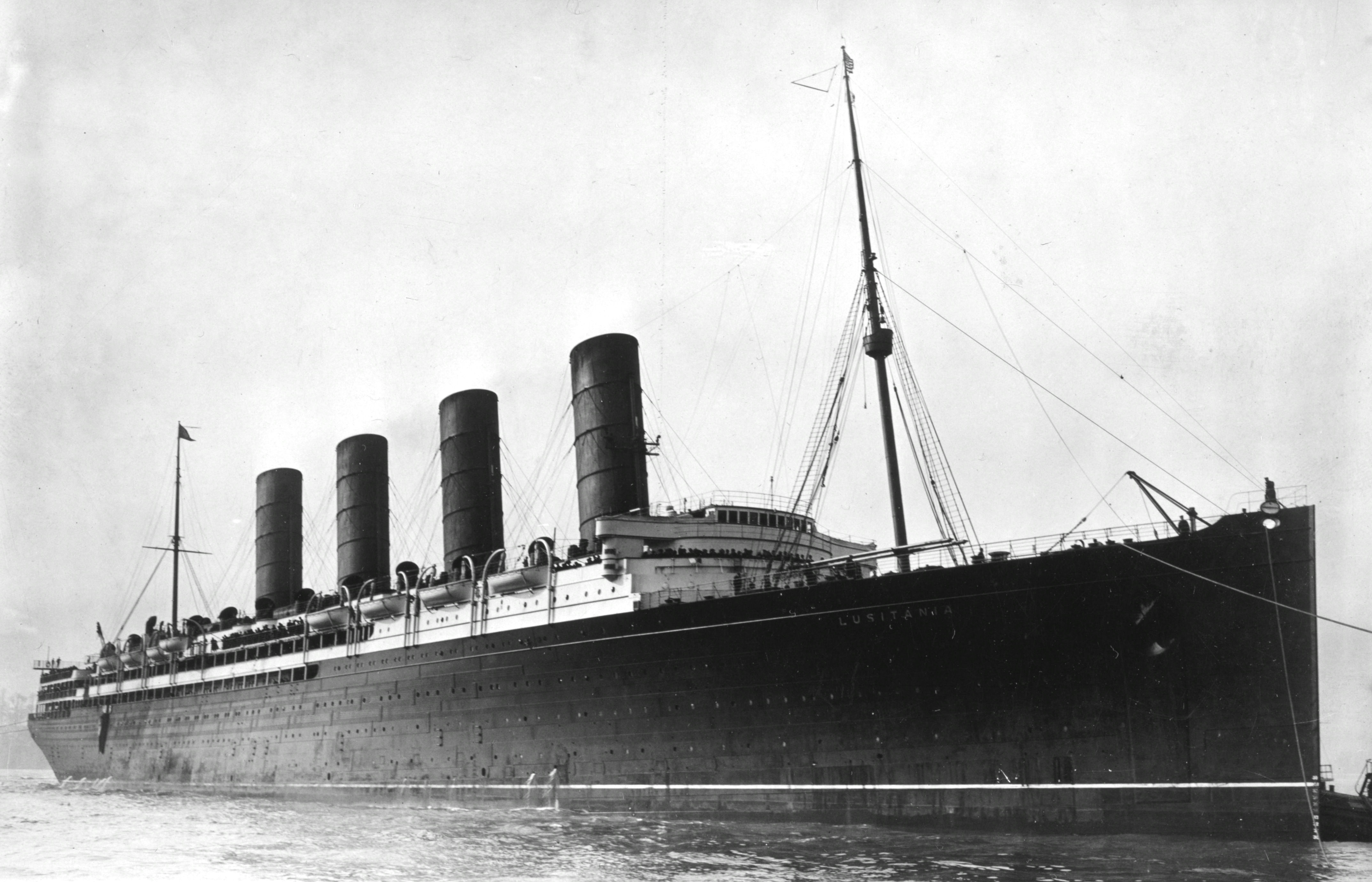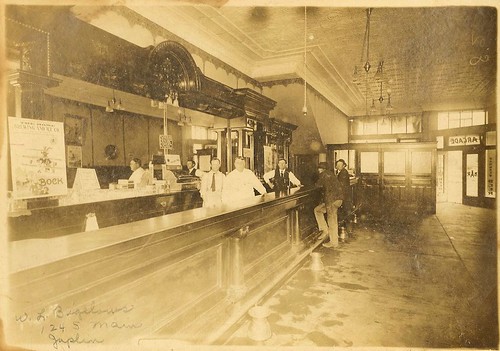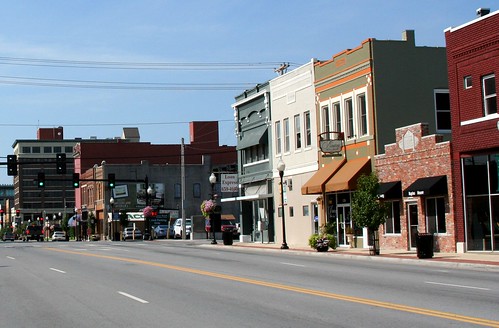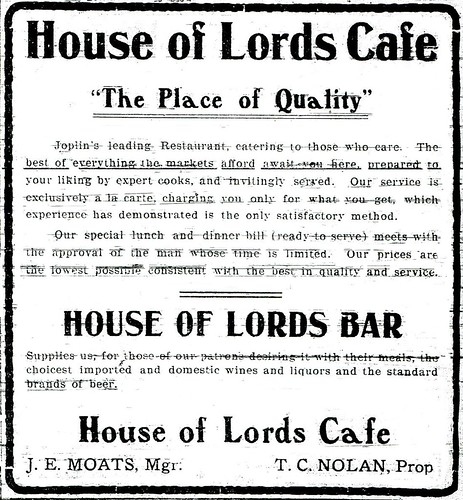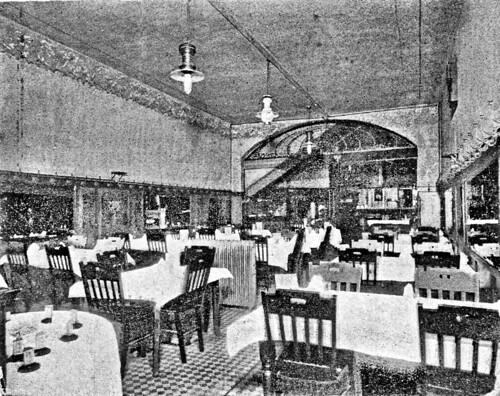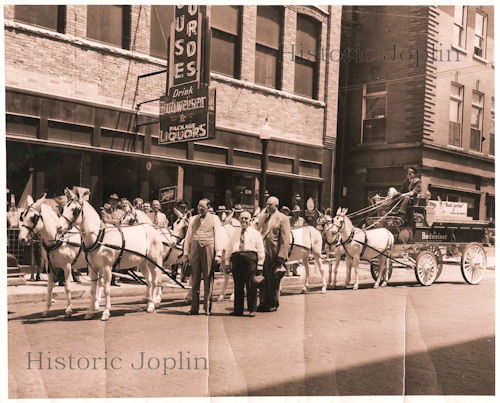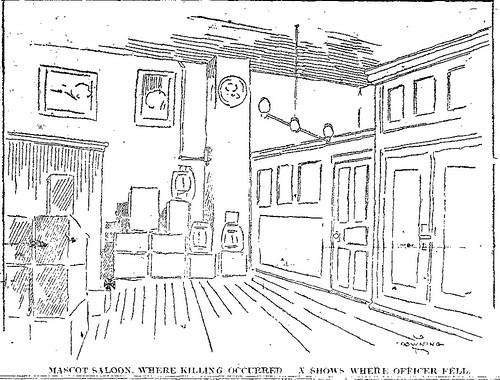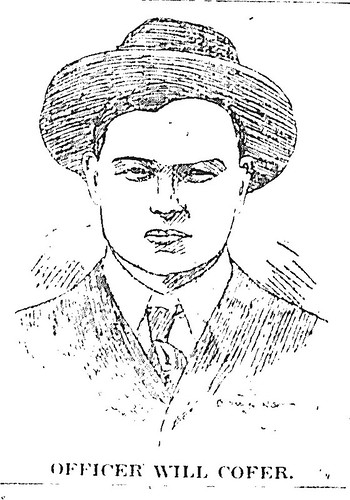Joplin was a city that at times was known for the number of its bars versus the number of its churches. The Missouri Trade Unionist, a weekly paper published in Joplin, opted to review the bars in Joplin in 1914, concerning where the “leading buffets” were located. In regard to the bars, the Missouri Trade Unionist, adamantly stated, “every liquor dealer in this Review Edition today conducts an absolutely orderly place, free from rowdyism or disgraceful scenes, and even though the boy under age escapes parental authority; and attempts to purchase a drink, he is not only denied the privilege by the saloon man, but often receives a moral lecture of more value to him than any emanating from any other source.” That the bars be virtuous was an important selling point, if not practice, due to a growing atmosphere of prohibition that had only a few years earlier sought to make Joplin a dry town, and had succeeded in drying up many neighboring counties and communities.
Indeed, the weekly paper referred to a Liquor Dealers Association of Joplin, an organization which had the three stated goals: “1) To protect the legitimate liquor dealer from unjust and fanatical persecution by the enemies of the liquor business. 2) To educate its members in an honest endeavor to elevate the business to a higher standard and to divorce the saloon from all unlawful and criminal associations. 3) To protect the respectable, law abiding, saloonkeeper from law defying competitors and from the influence of the dive and disorderly saloon, which breed opposition to all saloons and lead to prohibition…” With an intent to hold up the finer examples of Joplin’s saloons, which also agreed with the paper’s political perspective, the weekly listed some of the following:
Brockman & Turner Buffet
“Messrs. Brockman & Turner enjoy a most excellent patronage of some of the very best people of our city. And they are friends of our cause in every sense of the word. Their place is stocked with every leading brand of imported and domestic wines, whiskies, brandies, beers and cigars. Their buffet is a very popular one with the people…Brockman & Turner are broad-minded, liberal men, who have aided the cause on more than one occasion, and they number a host of friends and patrons among the working people of Joplin.”

Clarketon Hotel Bar
“This saloon is located in the Hotel Building at 722 Main Street, and is one of the most popular and best equipped thirst parlors in the city….Mr. Mike Lawton, the proprietor, is highly respected and very popular…he carries a full line of choice cigars…”
Bartenders’ Union, No. 827
“Joplin Bartenders union, No. 827 was originally organized as a Cooks and Waiters’ local union, according to the charter on the wall at 417 Main Street…” It was affiliated with the “Hotel and Restaurant Employees’ International Alliance and Bartenders’ International League of America, with headquarters in Cincinnati. The bartenders soon became the majority members of the organization and the local now has a membership of about sixty, composed of many of the best bartenders of the city…the Union has a bar car card called the “Blue Label Bar Card” and those who desire to help the Bartenders elevate themselves re requested to patronize saloons where cards are displayed.”
The Galena Bar
“The Galena Bar is one of the extremely popular buffets in our city, owned and operated by Mr. Ross Adams, and located at 709 Main street….[he] is a friend of the cause of labor, and has always been first to aid any movement for the betterment of Joplin and her working people.”
Denton Saloon
Located at Sixth and Joplin, “Their place is patronized by the best class of people…It is our duty to patronize business men who are our friends, and we will make no mistake in giving our liberal cooperation to Messrs. Denton(s), who are public spirited, enterprising citizens and business men.”
Fehrenbach Wine and Liquor Company
Located at 111 West Sixth Street, “Among the progressive and well known business establishments mentioned in our columns of friends of labor, none are more worthy of attention…having been in business in Joplin at the same location for about eight years, during which time they have forged steadily to the foremost rank in business circles…This house is one of the largest of its kind in this section of the state, and they conduct a large business throughout the surrounding territory….they are distributors for the famous “Miller’s High Life Beer,” also other noted brands of products…Mr. Wm. Fehrenbach has been a Joplin resident for many years and bears the good will and esteem of the people.”
The Club Saloon
Located at 402 Main Street, “Mr. John Ferguson, the proprietor, is a warm friend of the cause of labor, and on many occasions has responded most liberally to our cause.
The Keystone Bar
Located at 107 East Fourth, “This buffet is conducted in such a manner that it is a pleasure to visit there…”
The Two Bills Bar
“We wish to direct special attention to the above named bar, which is located at 1056 Main Street…The place is always kept clean and orderly, and the most fastidious need feel no hesitation is making this their place…”
Hub Bar
Located at the “northeast corner of Fourth and Main streets…Stalwart men drink beer. The great middle class of intelligent, industrious workmen in the millions of workshops of the world find its cheer makes their work a pleasure and its strength feeds their muscles for the tasks they have to perform. You will find no better place to trade than the above named buffet. Their draught beer is always kept in good condition…”
Miners Exchange Bar
“Every wage earner and citizen of Joplin knows the Miners Exchange Bar as one of the most popular bars of the city. The proprietor, Andrew Fritach, is a popular host…at the establishment located at 610 Main Street, and is patronized by those who want the best wines, liquors and cigars.”
Brewery Workers, No. 193
“Brewery and Ice Workers’ Local union, No. 193, one of the strongest unions in the district, with a membership at present of seventy, was organized May 9, 1900….The Joplin local is affiliated with the International Union of United Brewery Workmen, affiliated with the American Federation of Labor, and all employees in breweries, agencies and ice plants are eligible to membership, with the exception of foremen who do not perform manual labor and hire and fire workmen. Those employed in the offices of a brewery are not entitled to membership.”
Stationary Engineers, No. 3
“Zinc Belt Local Lodge, No. 3, association of Engineers, entitled Engineers and Enlightened Mechanics, was formed May 31, 1900. The organization devotes a large part of its time to discussing problems which confront engineers, and pays no attention to strikes or boycotts, but has maintained a good organization the city for the last eleven years.”
House of Lords
“Peregoy & McCullough, Proprietors…These gentlemen conduct the well-known café and buffet at 319 Main street….These gentlemen have the hearty good will of hundreds of working people, a sincere advocate of good and intelligent organization and well-wishers to the wage earners….They are the type of men who believe in the motto of “Live and let live.”
Exchange Bar
“One of the extremely popular buffets of the city is that conducted by Mr. Wm. Fahrman and located at 112 West Fifth street….This is one of the really pleasant and well conducted bars of our city, and everything known in an up to date bar will be found there. The stock of goods include the best of imported goods, besides the domestic makes of the recognized manufacturers, and a fine supply of the best of bottled and keg beers…”
The Palace Bar
Located at 828 Main street,”[Warner Rowe] carries a finely selected stock of whiskies, beers and union-made cigars….Our working people are always sure of a cordial welcome when they pay a visit to this popular buffet…”
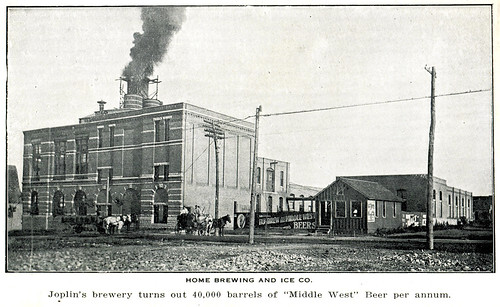
Home Brewing and Ice Co.
“Nothing in the history of American enterprise is more remarkable than the perfection to which brewing has been brought. The Home Brewing and Ice Company is producing beer quite the equal in purity, flavor and quality to the best brews of the old countries. The bottles beer, known as the “Middle West” is the most popular of any beer sold throughout this section, and for which absolute purity and nourishing qualities are unsurpassed.
The plant of this company is one of the most important enterprises of Joplin and furnishes steady employment to a large force of workmen, who are treated with the most fairness and consideration…the choicest hops and malt alone are handled in such a scientific manner as to result in a perfect beer, which for purity, flavor and uniform excellence is unequaled by few American breweries. The sanitary features of this brewery are above the average. All bottles, kegs and casks receive a thorough sterilizing and the bottling of the products is immediate after this sanitary precaution…. The beer of the Home Brewing and Ice Company is a standard of purity, much desired by the families of Joplin people….”
The Turf Bar
“Mr. Pete Braden, the proprietor of the Turf Bar, whose location is 123 Main Street, is a gentleman…He conducts one of our first class buffets and has always transacted all business on fair and just principles…”
The Irish Village
Located at 931 Main Street, “One may rest assured of getting the best when patronizing this place. The manager, Mr. R.G. Fordham, is broad-minded and liberal on the view of the labor question…”
The Ninth Street Bar
“Among the business men of our city, none have shown a more friendly feeling for the wage earners than Mr. Henry Paulson, proprietor of the Ninth Street Bar, located at 901 Main Street. There is no establishment in this section which holds a more esteemed and popular position…”
The Mayflower Bar
Located at 832, owned by Oscar Pfotenhauer, “This gentleman strives at all times to give his patrons the best of treatment and service, and he has always manifested a friendly attitude toward the men who toil, in fact, he numbers many of our members among his customers…”
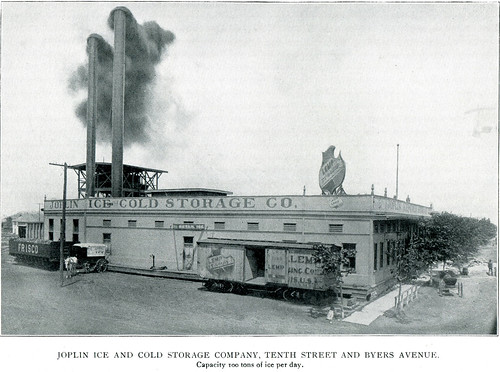
Joplin Ice and Cold Storage Company
“No industry in Joplin has grown to be a more important factor in the growth and prosperity of the city, nor caters more directly to the comfort and happiness of the people than has the Joplin Ice and Cold Storage Company, with office and plant located at Tenth street and Byers avenue….The wide practical experience of the management enables this company to handle all business with dispatch and accuracy, and the ice manufactured is absolutely pure and wholesome, and most carefully and hygienically made from the purest of distilled water, and is not touched by human hands until places in the refrigerator…
This company are sole agents and distributers in Joplin for the famous “Falstaff Bottled Beer” made in the brewery of Lemp, is known the world over as the choicest product of the brewer’s art, which is known to every union man throughout this district as a product made by a brewery that is true to union labor. The gentlemen composing this company are representative business men, and they have the highest standing in the business world. The management is fair and just with labor, and they well merit our hearty co-operation and patronage.”
The Broadway Street Bar
“Among the popular saloon men of Joplin who have built up a large business in their line and who are known to be friendly toward the working men is Mr. Frank McCammon, proprietor [of the bar]…which is located at 101 Main street….”
Mascott Bar
“Among the popular and successful business men in Joplin in their particular line is Mr. E.H. Faulstich…His success can be counted in no small measure to the fact that he has treated labor with a fair consideration at all times and we have every reason to wish him continued success…”
Michael A. Donahue Bar
Located at 1802 Main street, “Mr. Donahue handles none but the best in his line of merchandize and his place of business is always kept neat, clean and sanitary…”
The WoodBine Bar
Located at 417 Main Street, “Here you will find a large and select stock of choice wines, liquors and cigars….The management of this buffet is progressive and public spirited, and has always manifested a friendly feeling toward the cause of labor, and we would ask our members and readers to give this buffet their liberal and hearty cooperation at all times…”

